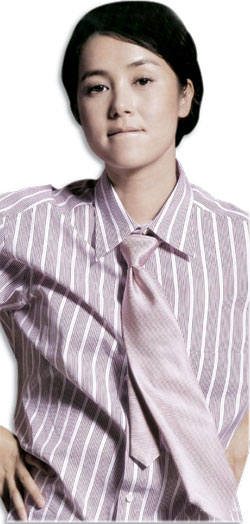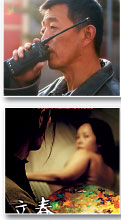
Director Gu Changwei's (right) follow-up to the acclaimed Peacock, which won him a Berlin Silver Bear award in 2005, is Li Chun, or And the Spring Comes, another 1980s period piece set in a Chinese town. For his second film, the cinematographer-turned-director again teamed up with screenwriter Li Qiang. Gu's wife, Jiang Wenli (main picture), was cast as the female lead, and won the best actress trophy at the Rome Film Festival for her portrayal of a frustrated artist who decides to follow a different path.
The film tells the story of Wang Cailing, (Jiang) an unattractive single woman consigned to the edge of society for her looks and her seemingly insane passion for Western opera. Longing to escape these frustrations, she travels to Beijing in search of work and her opera dream, but time and time again is turned away and forced back to her provincial life.

"It is a story about ordinary people's longing for dreams," Gu says. "Though crazy and hard to obtain, they are lovely because they make efforts and devotion to achieve them. Hope is always there."
Gu and his wife appeared together for the film's first domestic screening in Beijing, where he overcame his initial shyness and sang the praises of his leading lady.
"She deserves the Best Actress prize. She is the most diligent actress in the crew and it turned out that her performance is the highlight in the film," Gu says.
A graduate of the Beijing Film Academy, Jiang is one of the most famous actresses of China, garnering popularity and respect with almost every new work. Even her 10-minute performance as Mother of Little Pea in Chen Kaige's 1992 Farewell My Concubine commanded attention.
For Gu's new film, Jiang put on around 15kg, her natural looks disfigured with make-up.
"Wang is ugly in her appearance which is a sharp contrast with her dream," Gu says.
The role required her to learn the piano, perform opera and master a dialect.
"The role is totally different for me. But he (Gu) is good at cultivating the potential of actors. When everyone says impossible, he knows how much you can achieve without giving you any pressure. Then you are surprised you made it," she says. "No doubt, the story told through his camera is beautiful and touching."
And the Spring Comes opens with lovely shots of a traditional pagoda, expanding out to reveal a gray industrial landscape, which is a nice metaphor for Wang, a voice teacher in the local school with a penchant for Western opera. Though she lives in the same housing as the factory workers, she holds herself far above her neighbors,

boasting dishonestly of big-time Beijing connections.
Steel worker Zhou Yu (Wu Guohua) hears Wang singing through the public address system outside his factory and heads to the music academy where she teaches to ask if she can coach him in opera. He's less interested in singing than in Wang herself, but she falls for his best friend, handsome but talentless artist Huang Sibao (Li Guangjie, pictured above left). She surrenders her 30-year-old virginity and is quickly dumped.
And The Spring Comes has an unhurried charm and a poignancy with the same level of poetic payback as Gu's magical debut. Scenes in the industrial city are generally shot with natural light, and a sharp contrast between the dinginess of these cold boxes and the colorful opera gowns Wang dons to belt out Puccini. Gu's strength unquestionably lies in his depiction of a small industrial city, colorless and cement-enclosed, where dreams are discouraged.
"My two films, interestingly, are set at the same place named Heyang. Whereas it is different from Peacock, which is set during the period from 70s to 80s, And the Spring Comes tells the story happening in the 80s to 90s, when China is experiencing the revolution of social economic changes," Gu says.
"I have no pressure when I shoot films because I can always return behind the camera. As a director, I tell a story, either happy or sad, depressing or exciting, and what I am concerned with most is whether viewers foresee the hope after seeing my films."
The film is likely to open in Chinese theaters in February, when "the spring does come," Gu says.
(China Daily 11/21/2007 page6)